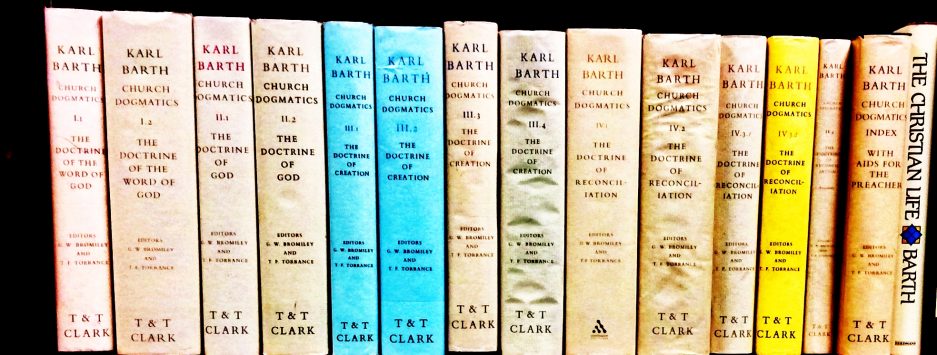Yesterday, a box from Purolator came with my gratis copies of Karl Barth on the Filioque. I’m very pleased with how Ashgate designed the text!
Here’s a snippet from the book itself. I’ve chosen a section in chapter five, dealing with the question of whether Barth’s theology of the filioque has any ecumenical significance to the filioque debate.
Can Barth’s defence of the filioque contribute anything significant to the contemporary ecumenical debate? Of course, the answer to that question will depend in large part on how one wants to use Barth. If Barth is sought as an ally in bringing about an ecumenical solution to the filioque debate, it must be borne in mind that his contribution will at best be indirect. Barth can no more be viewed as successfully or single-handedly solving the age old dispute between East and West on the filioque than anyone else to this point, not to mention that Barth clearly had no intentions of wanting to “solve” a puzzle he did not think needed to be solved. He did not seek an apologetic for the filioque that would convince Orthodox or Old Catholic theologians regarding the acceptability of the filioque. Nor did he seek a synthetic solution that would be acceptable to both Eastern and Western churches. Nor did he seek to encourage the churches in the Western tradition (the Reformed churches in particular) to move toward a theological and historical repristination of the Creed whereby the original form of the Nicaeno-Constantinopolitan Creed was set over against subsequent Western trinitarian thinking. Nevertheless, Barth’s “failure” in this regard can hardly be counted against him; each of these options has been attempted since Barth’s death without resulting in full rapprochement between East and West, even if some of the results are showing some signs for being encouraged.
However, if Barth is heard on his own terms and from within his own systemic logic, even while acknowledging that his position prima facie has close affinity to the Western tradition, it becomes clear that Barth was less interested in defending the Western filioquist argument and more interested in better understanding what was dogmatically at stake if the filioque were denied, regardless of what might eventually take place at a formal ecumenical level. Rather than falsely claiming to understand the Eastern rejection of the filioque (which he apparently did not ponder for any significant length of time), Barth wanted to think through the meaning of the doctrine of the filioque as a Western, Reformed theologian. As Barth sometimes argued, it is pointless to denounce another tradition without first unpacking the internal dogmatic logic of one’s own tradition. Certainly, it is arguable that Barth could have provided a better defence had he investigated the Eastern position more closely. Yet that is to criticize his position for what he did not do, a common critique to be sure. . .
…Barth’s doctrine of the filioque is not wholly typical of historic Western defences. Most specifically, a dogmatic adherence to the filioque does not necessitate holding the notion of a “double procession” of the Spirit, despite the fact that this is how it has been described typically by Western proponents and Eastern critics alike. Rather than speaking of a double procession of the Spirit from the modes of being (or hypostases) of the Father and Son, Barth sought to preserve in this matter a delicate dialectic between the essence (Sein) and the persons (Seinsweisen) of the Trinity without giving ontological priority to one or the other. It is thus arguable that Barth was at least partly responsible for pointing ecumenically oriented scholarship in this direction during the later quarter of the twentieth century. Consequently, more research needs to be undertaken in comparing Barth with contemporary ecumenical scholars for whom the filioque is still a live issue. In particular, it is evident that careful consideration of the Athanasian parallels in Barth’s thought is needed, for Athanasius appears increasingly to be viewed as the common theological denominator by Western and Eastern theologians alike.
On the other hand, … [there is] ambiguity in Barth’s way of speaking of the filioque in relationship to “origin” in God and in the doctrine of perichoresis. Though Barth did speak of the origin of the Spirit from the Father and the Son, it is also the case that he increasingly links the filioque to the doctrine of perichoresis without delineating how perichoresis and origin are themselves to be related. Indeed, both Barth and Torrance ultimately speak of the procession of the Spirit in terms of perichoresis, even though both Eastern and Western traditions have normally spoken of the procession in terms of origin. More work must be done in order to disentangle these concepts.
David Guretzki, Karl Barth on the Filioque, Ashgate, 2009, pp. 184-6.

Awesome. Congratulations!
I like the line about “a delicate dialectic between the essence (Sein) and the persons (Seinsweisen) of the Trinity without giving ontological priority to one or the other”.
I was listening to a paper the other day about getting back to “origin” talk in regard to the Trinity, and it struck me that for all our talk of “self-giving” in the Trinity should there not also be talk of the “other-receiving” that is also going on? In a similar vein, when we talk about the Son as the Begotten One we can’t be satisfied to define the Father simply as the “unbegotten” one. He is the Begetting One. That seems important. He is not a Father without a Son. I wan’t to add a comment about the Spirit to fit with that but am at a loss, presently. Just shows I need to read your book! (And will)
congratulations it is finally done!!